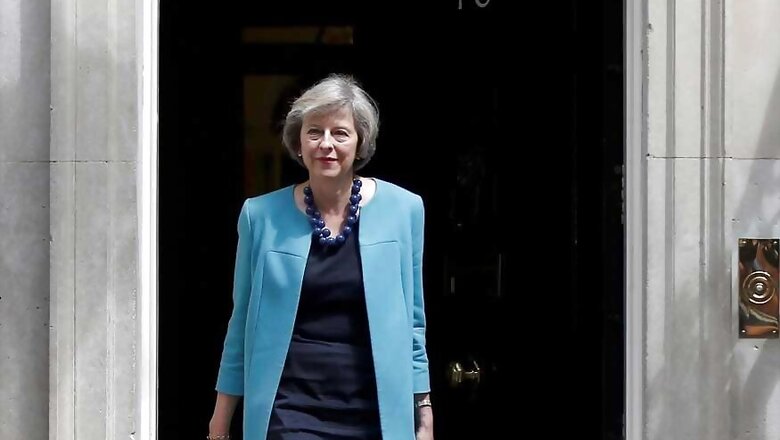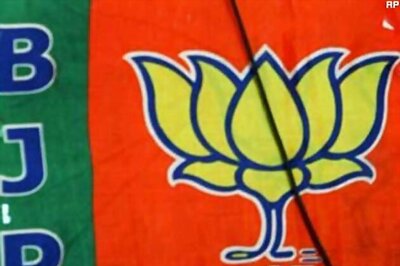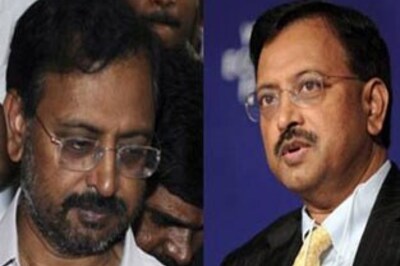
views
Washington: Donald Trump will get his first shot at face-to-face diplomacy on Friday when he welcomes his first foreign visitor to the Oval Office, British Prime Minister Theresa May.
The new US president and the premier, who took office in July, both have strong political incentives to make the visit -- likely to be heavier on symbolism and aspiration than deliverables -- a roaring success.
The Prime Minister is telling Britons their country will be a robust global trading power once it has exited the European Union, and a free-trade pact with the US is the most important pillar of that plan.
Trump also has an interest in talking up a trade deal. The envisioned agreement with Britain is exactly the kind of bilateral pact that the Trump administration says is the model for US trade policy going forward.
With his White House being castigated for protectionist policies, a strong commitment to work towards such a deal would allow Trump to flesh out his point that he is not against all trade -- just big multi-national pacts that he deems punitive to the United States.
However, he previewed the visit by griping that Democrats have yet to confirm his commerce secretary pick, Wilbur Ross.
"I'm meeting with the Prime Minister tomorrow, as you know. Great Britain ... I don't have my commerce secretary -- they want to talk trade. So, I'll have to handle it myself. Which is okay," he told Republican lawmakers in Philadelphia on Thursday.
Trump also starts the meeting from May from a position of strength, given that he is granting her the honor of being his first foreign leader visit. But his need for a successful outcome became more acute on Thursday, when a spat with Mexico over his vow to build a border wall swiftly escalated and caused the cancellation of a visit to the White House next week by President Enrique Peña Nieto.
May is getting time in the office unusually early after a presidential inauguration.
Former President Barack Obama chose then-Japanese Prime Minister Taro Aso as his first guest, a month after he was inaugurated. British Prime Minister Gordon Brown was his second guest but their summit -- remembered mostly for its awkward body language and other distractions -- didn't take place until March.
That May will be in the Oval Office exactly seven days after Trump was inaugurated is being seen by her entourage as a sign of the new President's respect for Britain.
Trump has often spoken of his administration for Queen Elizabeth II, and his mother's heritage in Scotland, where he owns two renowned golf courses.
Altogether, the visit offers Trump a fairly unchallenging first assignment as a world leader, though his paucity of diplomatic and political experience means his demeanor and stagecraft will still be closely watched.
And the careful choreography of his first week -- filled with rollouts of executive orders that fulfill key campaign promises -- has often been overshadowed by his penchant for making unpredictable statements and using disputed facts.
So it's not impossible the President could go off script or commit a diplomatic faux pas in front of the British press, which is always on the lookout for any linguistic nuance casting doubt on the "special relationship" -- a quirk that baffled the Obama administration in its initial engagements with the British.
May plans to use the visit to stress that though Britain is leaving Europe and Trump is suspicious of US attachments abroad, the two nations can still combine to be a force that can shape the world.
"We are excited -- it speaks to the breadth and the depth of the special relationship that we are the first country to be visiting," a UK official told CNN.
"As we rediscover our confidence together -- as you renew your nation just as we renew ours -- we have the opportunity, indeed the responsibility, to renew the 'special relationship' for this new age," May told GOP lawmakers Thursday in Philadelphia, her first US stop. "We have the opportunity to lead, together, again."
The British Prime Minister will also have the benefit of the advice of former President Barack Obama, who urged her to develop a close relationship with Trump in the hope that she and other center-right world leaders could be a moderating influence on him, according to a former senior administration official and a UK official familiar with the conversations.
But while the body language may well be positive between Trump and May, they still have their share of disagreements.
May's visit will be the first test of some of Trump's most controversial views on foreign policy, ones that put him at odds with the bulk of US allies.
Trump's statements that NATO is obsolete and that he wants to improve relations with a Russia that has been testing the borders of post-Cold War Europe have triggered alarm on the other side of the Atlantic.
Trump's hostility to environmental regulations introduced by the Obama administration to comply with the international Paris climate agreement are also sparking opposition to the new White House in the UK.
May also was critical of Trump's conduct towards women following revelations about his past during the election campaign.
The no-nonsense Prime Minister is making clear that while she plans to forge a close relationship with Trump, she will not hesitate to speak her mind.
"I am not afraid to speak frankly to the President of the United States," May said in Parliament on Wednesday. "I am able to do that because we have this special relationship."
May is likely to impress upon Trump the importance and continued vitality of NATO. Britain's calls for all members to meet their military spending target of 2% of GDP, may allow her government to become a point of liaison between states in the Western alliance and the new president, who has frequently groused that US allies have not done enough to pay for their own defense.
And then there are their backgrounds, which provide little common ground.
The President is brash, boastful, larger than life, obsessed with his self-image and not prone to delving deeply into the details of policy.
May, a clergyman's daughter, is conservative, self-contained and renowned for poring over briefing books late at night. Her only visible flamboyance is a penchant for leopard skin kitten heels.
But while they may not be soulmates, Trump and May both find themselves caught up in the tectonic shifts that have rocked modern politics and felled the establishment on both sides of the Atlantic.
Trump, the master of disruption, backed the British exit from the EU and hopes more countries follow suit -- in direct contravention of decades of US foreign policy that saw stability in a united Europe.
May did not back Brexit, but in the political carnage that followed the vote suddenly found herself prime minister and must now manage the most volatile political turbulence in Western Europe since the fall of the Berlin Wall.
"I think that both Trump and May actually have strong appeal to Middle America and Middle England, and I think there are some similarities in their approach," said Nile Gardiner, director of the Margaret Thatcher Center for Freedom at the Washington-based Heritage Foundation.
"I would expect their partnership to actually be a very strong one even though their characters may be somewhat different in some respects," he predicted.
Gardiner believes that after falling behind Germany and Chancellor Angela Merkel in the eyes of the Obama administration, the arrival of Trump is likely to repair Britain's importance to US transatlantic relations over the next four years.
Trump's hostility to the European Union and equating of Brexit voters to kindred spirits with his own supporters who powered a rupturing of the political establishment also may cause him to look kindly on Britain.
A Trump trip to the country as president is widely expected to take place in the summer.




















Comments
0 comment